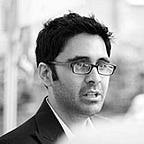This is How You Recover From Fascism — and America’s Not Doing Any of It
Recovering From Fascism Takes Three Things. America’s Not Doing Any of Them.
What does it take for a society to recover from fascism? That’s a question — maybe the question — that America should be asking right now. And if you’re one of the annoying types who’s going to ask “why?!” in mock outrage — a good white liberal — I shouldn’t have to remind you: over the last few years, the Trump Years, America experienced the classical sequence of fascist collapse, from concentration camps to kids tortured in them to Gestapos disappearing people on the streets all the way right down to a bloody coup attempt at the Capitol.
Yes, it really was fascism — and it still is. The GOP is unrepentant. It hasn’t learned a damned thing. But has the rest of America?
It takes three things for a society to recover from fascism. It takes three forms of collective action, to be precise, which result in new institutions, norms, values, codes, and laws.
The troubling thing is this. America’s not asking the question. It’s not on the lips of pundits. Ezra Klein is still busy pretending fascism didn’t happen, and Chris Hayes is right back to obsessing over political minutiae. American pundits have never been good with either the big picture or the truth. And the average American and politicians take their cues from them. So the whole question of “what does it take to recover from fascism” is going entirely unasked. And in that way, America isn’t learning anything from the Trump Years. So will it? Can it?
The first thing it takes to recover from fascism is justice. Not just mundane justice — regular old justice of the everyday kind. It takes a special kind of justice. To bring the Nazis to justice, the world’s great minds thought, frowned, and thought again. Regular justice was to prosecute abuse and exploitation and even murder. But on a social scale? A whole new kind of justice was required. And so the idea of “crimes against humanity” like “genocide” was born. This special kind of justice superceded everyday forms of it. It was justice for a higher kind of crime. That legacy took half a century to unravel itself, and finally, only in the 1990s, was the International Criminal…
